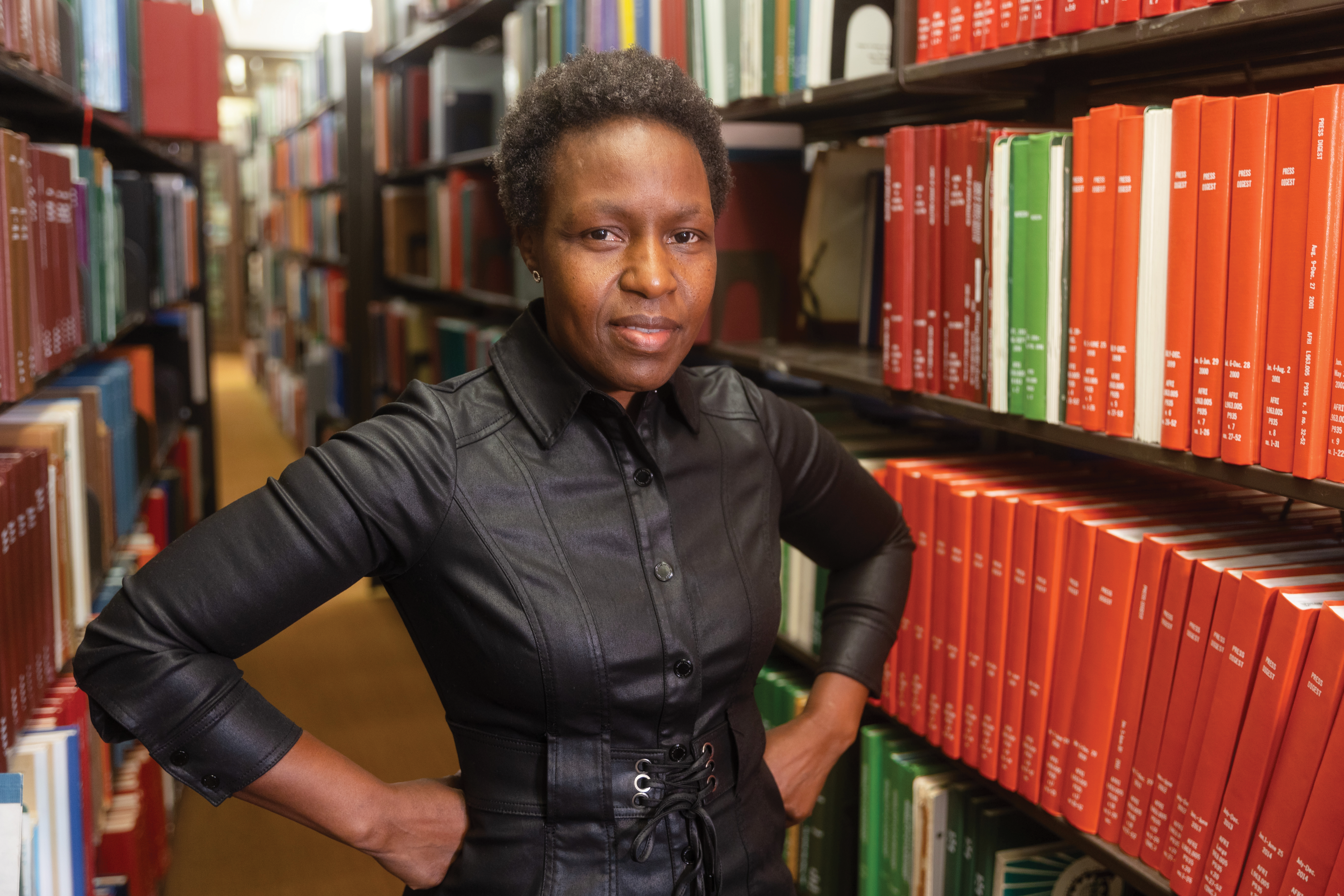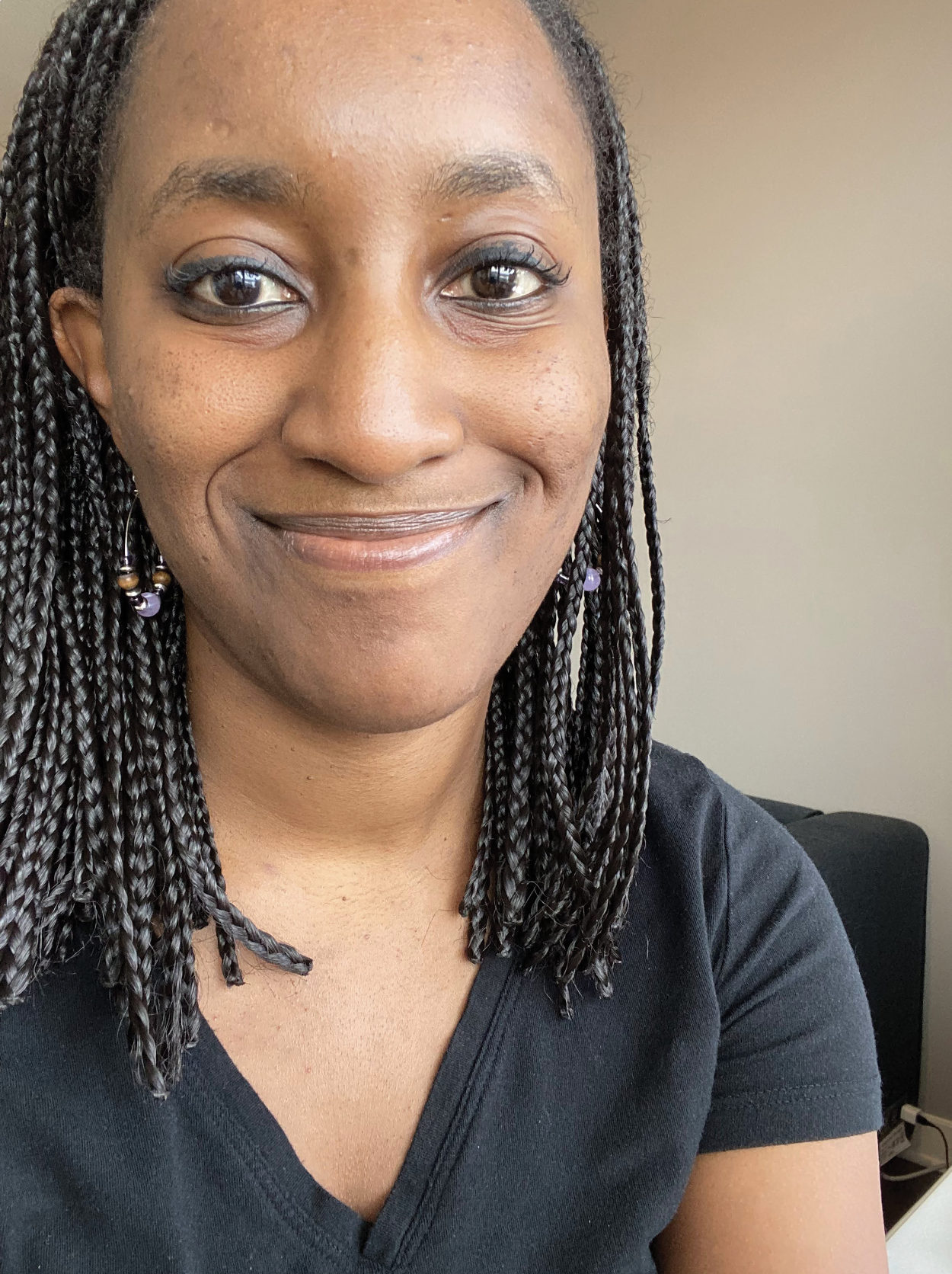Florence Mugambi, Northwestern’s African Studies librarian, recalls constantly searching for books to read when she was growing up in the remote village of Ontulili in eastern Kenya. When she arrived at the University of Nairobi as a student, textbooks were still scarce. She often had to borrow books from a few of her friends and pass them on within the group. Mugambi even met her husband by borrowing his textbook.
Now, Mugambi is trying to change that for Kenyan children. Since 2010, she has been building a library to increase access to books for the community in her home village.
“If and when that will be completed, I think my life will be made,” Mugambi says.
Mugambi is one of more than forty subject specialist librarians at the Northwestern University Libraries. They compile research guides for university courses, help Northwestern students navigate their research projects and, in some cases, welcome visiting researchers from around the world. But aside from their ordinary duties, many of them, like Mugambi, also pursue projects that help to increase access to library materials for both students and the public.
Accessing a brighter future
Mugambi’s position as the sole librarian for Northwestern’s African Studies library is no small task. The Melville J. Herskovits Library of African Studies, located on the fifth floor of University Library, has the largest separate Africana collection in the world. As a result, Mugambi receives African studies scholars from around the world every year.
But as she spoke of her work, it was her yet-completed library in Ontulili, Kenya that brought her the most excitement.
Mugambi’s dream of building a library in Ontulili began in 2001. That year, she and her husband moved to Baton Rouge from Kenya to pursue graduate degrees at Louisiana State University.
“There are so many books and so many reading materials, but I am from a place where this doesn’t exist,” Mugambi remembers thinking.
She began with small-scale donations from book drives and people she met through her connections as a librarian, delivering batches of books at a time to her home village. But gradually she realized that wasn’t enough. In her subsequent trips back to Kenya, she found passionate children and empty bookshelves. Because there wasn’t a proper space to store the first round of books, they were destroyed by rats.
"It’s home. And it’s a wonderful project.”
Florence Mugambi, librarian for Northwestern’s African Studies library
In 2010, when she was a librarian at Purdue University Fort Wayne, Mugambi founded the Ontulili Literacy Project in hopes of cultivating a reading culture for the children in Ontulili through the construction of a physical library. With a population of around 11,000, the village is home to seven primary schools and three secondary schools, all without libraries.
Although her hopes were high, Mugambi realized that building a library was not an easy task. After breaking ground in 2015, she originally hoped construction would be complete by 2018. But issues with funding, her move to Northwestern in 2017 and the pandemic all contributed to a four-year delay.
 Librarian Florence Mugambi at Northwestern University Main Library.
Librarian Florence Mugambi at Northwestern University Main Library.
Despite these challenges, Mugambi never considered giving up.
"It’s home,” Mugambi says. “And it’s a wonderful project.”
Right now, the library is still missing a roof and windows. Mugambi estimates that with an additional $50,000, construction can be completed in the next year. Fortunately, with the connections she built as a librarian throughout her career, filling the library shelves with books should not be a problem.
“The money is not unattainable,” Mugambi says. “I think it’s just focusing on reaching out to passionate people. If a student group here is willing to contribute, it will be more than appreciated.”
Accessing a rich history
As Mugambi is busy working to help Kenyan children reach a brighter future, Charla Wilson, the university’s archivist for the Black experience, is trying to build a bridge to the past. Since arriving at Northwestern in 2017, Wilson has uncovered and documented previously hidden Black history through archival materials and created multiple exhibits to showcase them.
It was Black history that brought Wilson, a former museum archivist from San Diego, to Northwestern. Following demonstrations against institutional racism in 2015, Black students and alumni demanded the creation of Wilson’s current position to better document the lives of the Black community on campus.
Wilson says her love for African American history was inspired by her dad, who always shared his well-researched family genealogy at the dinner table when she was growing up. The conversations often evolved into a broader discussion of African American history.
 Charla Wilson, Northwestern’s archivist for the Black experience. Photo contributed by Charla Wilson.
Charla Wilson, Northwestern’s archivist for the Black experience. Photo contributed by Charla Wilson.
Those interests propelled Wilson to study history and education in graduate school. There, her research on San Diego’s Young Women’s Christian Association revealed how Black history in the city, where only 6% of the population is Black, was poorly documented.
“It was so disappointing to see how little African American history was reflected in the repositories there,” Wilson says. “There’s more that can be done.”
What she also found out in the process was that materials on Black history were available, just hidden and waiting to be discovered. Wilson started wondering what more she could do to draw more attention to collections that depict historically marginalized groups and how to better preserve documents that tell their history.
Those questions led Wilson to Northwestern in 2017 when the role was created. As far as Wilson knows, no other non-historically Black college or university has an identical position specifically designated to document Black history on campus.
“It’s important because it gives us a fuller sense of this history,” Wilson says. “I think it would be a disservice to the people in the past to neglect their existence. The more we can capture, the better it will serve in the future when people want to access them and write their histories. It would just be a shame to distort history.”
Affordable access
In addition to Wilson, Lauren McKeen McDonald, the Communication studies librarian, is also concerned with students’ accessibility to information. She leads a project that aims to bring more free textbooks to students at Northwestern and beyond.
Three years ago, McDonald and her colleague Chris Diaz, the digital publishing librarian, brought the concept of open education to Northwestern. It’s the belief that educational materials should be free for everyone to access, McDonald says.
Currently, instructional materials in Northwestern courses can cost as much as $200, creating a barrier to knowledge for many students. As the university’s Open Education Resources (OER) librarian, McDonald now works with faculty members to produce the textbooks they write so it will become openly accessible once they’re published. So far, 17 groups of faculties have received grants to create free textbooks, and a few of them are already being used in a range of introductory courses like statistics, Swahili and chemistry.
Medill professors Desiree Hanford and Patti Wolter received a grant this year to create an online textbook for Journalism 201-1, an introductory course required for all Medill first-years. They wanted to write a comprehensive textbook that reflects Mediill’s values and what they try to teach, so that lecturers would no longer have to pull materials from various sources.
"A lot of students will go through their academic career and not interact with the library or with their librarian, and I think that they’re missing out."
Lauren McKeen McDonald, NorthwesternCommunication studies librarian
Hanford says she hopes the new book will be useful to both lecturers and students when it is completed in two years. The OER program can distribute their textbook among other schools that are also a part of the program for other instructors to adapt and use.
"It’s a pretty big undertaking,” Hanford says. “Lauren has been instrumental in this whole process.”
Whenever the professors needed help with breaking down the book’s structure or adding video instructions, McDonald was always ready to meet with them and keep them on the right path, according to Hanford.
“I’m super passionate about what I do,” McDonald says. “I’m thrilled that I’d be able to make a difference and lower the cost of courses, and help faculty to be able to create something that is perfectly catering to their course.”
In the future, McDonald hopes that she and Diaz can continue to expand the program, publishing more textbooks in different subject areas and reaching more schools to circulate the work of Northwestern professors.
She also hopes students can develop a relationship with the library and utilize the many resources that are available.
“A lot of students will go through their academic career and not interact with the library or with their librarian,” McDonald says. “And I think that they’re missing out.”